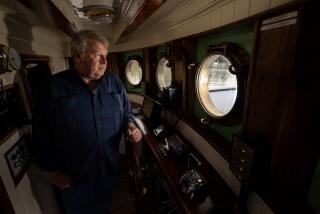‘It taught me what can happen when fame and glory become the primary goal.’
The opening bash of the new Long Beach Watersports Co. began as a lighthearted affair. Lounging in brightly colored rubber rafts, a mixed bag of celebrants sipped beer and munched on potato chips. Staring at a video screen, they hooted at the white-water antics of fellow river rafters.
But when Gary Peebles showed his slides of a makeshift grave on a bank of the Yangtze River, the mood turned somber.
All his life Peebles, 40, has loved the water. A biology teacher at Buena Park High School, he first became interested in river rafting in 1970. For a time, he even had his own weekend business organizing rafting trips in Kern County.
The ultimate thrill of his rafting career was to have been realized last year in China when he joined an American and Chinese expedition hoping to be the first in history to run the treacherous upper 1,900 miles of the Yangtze River. For Peebles, it turned out instead to be a six-week ordeal that included the death of a friend and ended in mutiny.
“It taught me what can happen when fame and glory become the primary goal,” he said in a recent interview at his Long Beach home.
Expedition leaders have a radically different interpretation of what occurred on the trip. But Peebles says the experience changed him from someone for whom traversing the Yangtze in a rubber raft was the challenge of a lifetime, to a man much more attuned to the less adventurous but finer pleasures of life like home and family. In fact, it is a story he has expounded on with almost missionary zeal in interviews and lectures since returning.
The teacher’s interest in the expedition was first piqued by a magazine article he read in 1985, he said. After corresponding with Ken Warren--a Portland rafter and organizer of the planned 50-day expedition--Peebles eventually contributed $2,000 to the undertaking and was invited along as an assistant boatman when the group embarked last summer.
Right from the outset, he said, there were problems.
For one thing, it became almost immediately apparent that the expedition would not be the first to complete the trek, having been shortly preceded by an all-Chinese expedition. For another, according to Peebles, there were serious shortcomings in planning and equipment.
Matters came to a head about four weeks into the trip when David Shippee, a 29-year-old photographer from Boise, Idaho, whom Peebles had befriended, came down with high-altitude sickness, an ailment that caused his lungs to fill with fluid. Hundreds of miles from help, stranded in the middle of Tibet with no viable means of ground transportation and only limited communications, Shippee died within a few days. Rather than carry his body the rest of the way, the crew buried it alongside the river in a grave marked by Chinese and American flags.
“When Dave died,” Peebles recalled later, “I realized that it could have been me.” What had begun in his mind as an innocent adventure, he said, had suddenly become a perilous journey of life and death under leadership he no longer trusted.
Peebles attributes Shippee’s death in part to a lack of emergency precautions--such as adequate communications and evacuation procedures--by expedition leader Warren. Peebles says now that he believes Warren was more interested in satisfying the cameramen along to record the event for an upcoming television special (to be aired April 26 and May 3 on ABC) than he was in assuring the safety of the 11-member crew. The television production is part of a long-term plan Warren has to create a major commercial rafting venture in China.
But the 59-year-old expedition leader adamantly denies having done anything to undermine the safety of his crew. “We did everything we could,” Warren said. “We had all the medical equipment necessary.”
If he erred, he said, it was in taking along people like Shippee--who Warren said had concealed a history of respiratory ailments that would have disqualified him from the trip--and Peebles, who Warren said was woefully ill-prepared for the risks and rigors of a 1,900-mile trip down the world’s third longest river.
Whatever the case, Peebles and three other crew members--after participating in a short-lived mutiny--left the expedition 10 days later upon reaching the next major town along their route. After struggling on for several more weeks, Warren and the rest of the crew abandoned their effort 800 miles short of the original goal.
Since returning home, Peebles has been very vocal in talking about the trip and what it meant in changing his view of outdoor adventuring; this despite a letter from Warren threatening legal action if Peebles continues granting interviews, giving slide shows or spreading “false and damaging statements” regarding the expedition.
In addition, he has been much more generous and loving towards his family and friends than before he left, according to Peebles’ wife, Karla.
Some of that is evident during public appearances like the one earlier this month at Long Beach Watersports--a local rafting company.
Although Peebles plans to keep on rafting, he says he feels a need to warn others about the dangers of taking anything too seriously--of getting so caught up in the pursuit of thrills that they lose sight of the more important aspects of life.
“It has really helped me focus on what kinds of things are important to a person’s happiness,” the teacher said of his experience on the Yangtze. “When you get hooked into the dream of fame and glory rather than personal satisfaction, it can become poisonous.”
More to Read
Sign up for Essential California
The most important California stories and recommendations in your inbox every morning.
You may occasionally receive promotional content from the Los Angeles Times.










